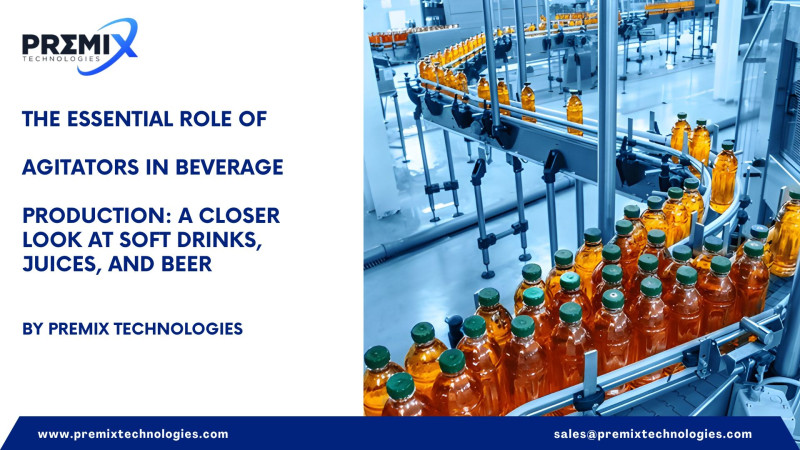The Essential Role of Agitators in Beverage Production:
A Closer Look at Soft Drinks, Juices, and Beer
In the competitive beverage industry, consistency, flavor, and quality are paramount. Whether producing soft drinks, juices, or beer, the mixing process is critical in determining the final product's taste, texture, and stability. Agitators are key players in ensuring that each beverage meets these high standards, delivering a product that consumers love.
This blog will explore the role of agitators in the production of three popular beverage types: soft drinks, juices, and beer. We’ll delve into the specific processes, the chemicals involved, and how the right choice of agitator can elevate beverage production to new heights.
1. Soft Drinks and Juices: Perfecting Sugar Dissolution and Flavor Mixing
Process: Sugar Dissolution and Flavor Mixing
Chemicals: Sucrose, Flavorings, Carbonated Water
Agitator Type: Propeller Agitators
The production of soft drinks and juices involves several critical steps, with sugar dissolution and flavor mixing being among the most important. The right balance of sweetness and flavor is essential to creating a beverage that appeals to consumers and stands out in a crowded market.
Propeller agitators are widely used in this process. These agitators are designed to mix liquids quickly and efficiently, ensuring that sugar (often in the form of sucrose) dissolves completely in the water. This step is crucial, as undissolved sugar can lead to inconsistent taste and texture, which can negatively impact the consumer experience.
In addition to sugar, flavorings are also evenly distributed throughout the liquid using propeller agitators. This ensures that each sip delivers the same delightful taste, whether it's a fruity juice or a refreshing soft drink. By optimizing the mixing process, manufacturers can achieve a product with a consistent flavor profile, which is key to brand loyalty and consumer satisfaction.
2. Beer: Mastering Wort Aeration and Fermentation
Process: Wort Aeration and Fermentation
Chemicals: Malted Barley, Hops, Yeast
Agitator Type: Turbine Agitators
The production of beer is a complex process that requires careful attention to detail, particularly during wort aeration and fermentation. These stages are crucial for developing the beer's flavor, aroma, and alcohol content.
Turbine agitators are often employed during wort aeration, where they play a critical role in mixing the wort and introducing oxygen. Oxygenation is vital for yeast health, which directly impacts the fermentation process. A well-aerated wort ensures that yeast can effectively convert sugars into alcohol and produce the desired flavor compounds.
During fermentation, turbine agitators continue to ensure that the yeast is evenly distributed throughout the wort. This even distribution is essential for consistent fermentation, which in turn leads to a uniform flavor and alcohol content in the final beer. By using the right agitator, brewers can achieve a beer that meets their exact specifications, batch after batch.
3. Dairy-Based Beverages: Homogenization and Fermentation in Milk and Yogurt Production
Process: Homogenization and Fermentation
Chemicals: Milk, Bacterial Cultures (e.g., Lactobacillus bulgaricus), Stabilizers
Agitator Type: Paddle or Turbine Agitators
The production of dairy-based beverages like milk and yogurt involves processes that require precision and consistency to achieve the desired texture and taste. Homogenization and fermentation are two key stages in which agitators play a crucial role.
Paddle agitators are commonly used during the homogenization process. They help to break down fat globules in milk, ensuring an even distribution of fat and a smoother, creamier texture. This process is essential for producing milk that has a consistent mouthfeel and appearance.
During yogurt production, turbine agitators are used to mix bacterial cultures with milk. This step is crucial for initiating the fermentation process, where the bacteria convert lactose into lactic acid, giving yogurt its characteristic tangy flavor and thick texture. By ensuring even mixing, turbine agitators help produce yogurt that is both delicious and consistent in quality.
Conclusion
In the beverage industry, the role of agitators cannot be overstated. From dissolving sugar in soft drinks and juices to ensuring even fermentation in beer production, these tools are essential for creating high-quality beverages that meet consumer expectations.
By selecting the right agitator for each process, manufacturers can optimize their production lines, reduce waste, and ensure that their beverages consistently deliver the flavor, texture, and quality that consumers demand. Whether you're producing soft drinks, juices, beer, or dairy-based beverages, investing in the right agitation technology is key to staying competitive in the market.
Inquiry Now on www.premixtechnologies.com


